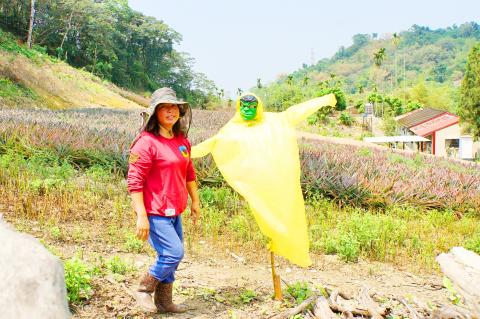After monkey raids claimed hundreds of pineapples at her hillside farm in Yunlin County’s Linnei Township (林內), Liao Yueh-ying (廖月瑛) started using “Jigsaw” scarecrows, which she styled after the fictional serial killer from the horror franchise Saw, to protect her crop.
Marauding bands of wild monkeys have eaten or smashed about 260 pineapples between the middle of last month and late this month, Liao said on Thursday.
The loss was particularly galling, because it was almost harvest time, she said.

Photo: Chan Shih-hung, Taipei Times
“It feels bad to find unripened pineapples that the monkeys had picked up and thrown away, but it is even worse to see what is left of the ripe ones,” she said.
Seven or eight years ago, monkeys used to appear singly or in pairs, which posed little trouble to farmers, but they have recently started to appear in packs of 30 or more, Liao said.
Worse yet, the monkeys have no fear of people, she said.
Using firecrackers was somewhat effective, but impractical, as it would have cost the farm about NT$13,000 until harvest time and requires someone to be on patrol at all times, she said.
It was her son, a high-school student, who gave her the idea to use scary scarecrows.
Using “Jigsaw” masks, mannequins and plastic rain cloaks, she made several scarecrows, she said.
There are also several “Hulk” scarecrows, inspired by the Marvel comics character, around her farm, she said.
The scarecrows seem to be effective and she has not seen a monkey in the three days since she put them up, Liao said, adding that she plans to put up more scarecrows and change their positions frequently to keep the monkeys away.
“I do not know about monkeys, but they gave me a good scare,” a local resident said.
“Farming is difficult enough without having all these monkeys mucking about,” Linnei Mayor Chang Wei-cheng (張維崢) said. “Top government officials should rethink their wildlife protection policy.”
The township office said it is increasing the budget to help keep monkeys off the farms and buy firecrackers, he said.

The Taipei Mass Rapid Transit (MRT) Wanda-Zhonghe Line is 81.7 percent complete, with public opening targeted for the end of 2027, New Taipei City Mayor Hou You-yi (侯友宜) said today. Surrounding roads are to be open to the public by the end of next year, Hou said during an inspection of construction progress. The 9.5km line, featuring nine underground stations and one depot, is expected to connect Chiang Kai-shek Memorial Hall Station to Chukuang Station in New Taipei City’s Jhonghe District (中和). All 18 tunnels for the line are complete, while the main structures of the stations and depot are mostly finished, he

The first global hotel Keys Selection by the Michelin Guide includes four hotels in Taiwan, Michelin announced yesterday. All four received the “Michelin One Key,” indicating guests are to experience a “very special stay” at any of the locations as the establishments are “a true gem with personality. Service always goes the extra mile, and the hotel provides much more than others in its price range.” Of the four hotels, three are located in Taipei and one in Taichung. In Taipei, the One Key accolades were awarded to the Capella Taipei, Kimpton Da An Taipei and Mandarin Oriental Taipei. Capella Taipei was described by

Minister of Economic Affairs Kung Ming-hsin (龔明鑫) yesterday said that private-sector refiners are willing to stop buying Russian naphtha should the EU ask them to, after a group of non-governmental organizations, including the Centre for Research on Energy and Clean Air (CREA), criticized the nation’s continued business with the country. While Taiwan joined the US and its Western allies in putting broad sanctions on Russia after it invaded Ukraine in 2022, it did not explicitly ban imports of naphtha, a major hard-currency earner for Russia. While state-owned firms stopped importing Russian oil in 2023, there is no restriction on private companies to

President William Lai (賴清德) is expected to announce a new advanced “all-domain” air defense system to better defend against China when he gives his keynote national day speech today, four sources familiar with the matter said. Taiwan is ramping up defense spending and modernizing its armed forces, but faces a China that has a far larger military and is adding its own advanced new weapons such as stealth fighter jets, aircraft carriers and a huge array of missiles. Lai is expected to announce the air defense system dubbed “Taiwan Dome” in his speech this morning, one of the sources said. The system